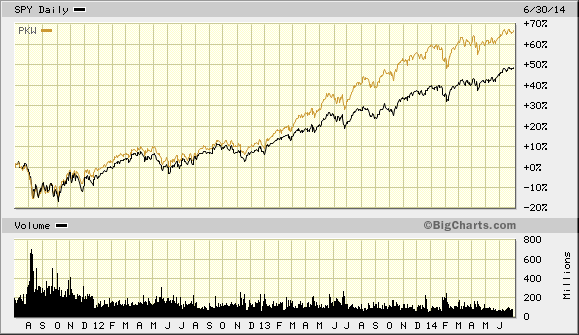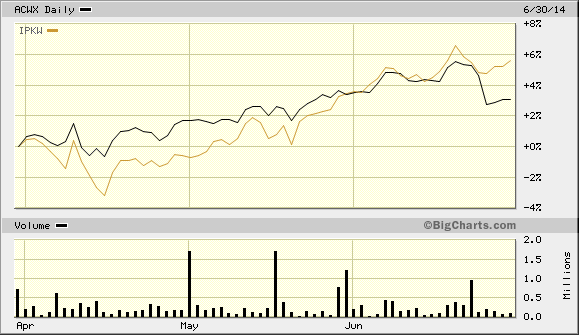According to a study by LPL Financial, the “smart money” may be exiting equities. Hedge funds, institutions, insiders and foreigners were net sellers of stock in June. The net buyers? Individuals and corporations. The brokerage firm’s chief market strategist, Jeffrey Kleintop, further explained that companies buying back shares of their own stock accounted for most of the purchasing activity.
Same Old Song
Corporate buybacks are hardly a new phenomenon. Rather than hold too much cash on their books, companies often invest in their own shares if they believe that their stock is undervalued. That’s the positive spin. The more cynical narration is that corporations artificially support stock prices as well as massage the perception of how profitable they are. In essence, when a company reduces the total number of outstanding shares by purchasing them, profits per share move higher; market participant perception can be “goosed” even if total earnings have flatlined.
Considering the fact that pensions, insurers, hedge funds, large money managers, insiders were net sellers in June — every grouping other than individuals and the corporations — it stands to reason that individuals are the only market participants who believe the earnings story. In other words, most seem to conclude that companies are not repurchasing shares because they feel that respective stock prices are undervalued; rather, most players feel that current corporate buybacks are a mechanism of manipulation.
It may be hard to argue otherwise. According to Birinyi Associates, companies spent roughly $600 billion in buybacks in 2013. That marked the second highest calendar year of corporate allocation to stock in history. What’s more, the buyback craze has maintained a torrid pace here in 2014. Interestingly enough, the largest annual amount spent in history came in 2007, right before the onset of the recession and the subsequent collapse of the financial system.
Where's The Cash?
What has been missing in the discussion of buybacks is where the corporate cash is not going. Specifically, if companies really felt good about the prospects of the globally interconnected economy, we might expect them to invest more heavily in new product development, human resources, marketing and a variety of aggressive efforts to expand.
Naturally, ETF enthusiasts may wish to know if there’s a way to capitalize on a market that is still trending higher, in spite of net selling by larger groupings. Possibly. PowerShares Buyback Achievers (NYSE:PKW) handily outperformed the SPDR S&P 500 (ARCA:SPY) over the prior 3 years. It should be noted, though, that virtually all of the excess gains came during the 2013 year when corporate buybacks were particularly robust.
Keep in mind, however, the U.S. may be seeing net sellers from larger institutions due to valuation concerns. International investments may offer more compelling valuations alongside greater stimulus from the world’s central banks. And that means, if the buyback approach works well for ETF investors in the earlier stages, one might have reason to consider PowerShares International Buybacks (IPKW). With only 3-months of data to look at, IPKW is outhustling the iShares MSCI ACWI X US (NASDAQ:ACWX).
Euphoria
Since we are discussing possible changes that investors might make to their portfolios at this time, I would be remiss if I did not address commentary by the Bank of International Settlements this weekend. The BIS is an association of the world’s top central banks and the consortium did not mince words in its condemnation of “euphoric” financial markets. In brief, the group suggested that global economic outlook is shaky at best and geopolitical strife is increasingly stressful to the well-being of the world economy. The buoyancy of the markets, they reported, is out of sync with the uncertainty.
Granted, investments always manage to climb a wall of worry. On the other hand, the irony of the BIS commentary is that the world’s central banks are largely responsible for rational or irrational investor optimism. The U.S. Federal Reserve, the European Central Bank, the Bank of England as well as the Bank of Japan have all engaged in policies that have kept interest rates unnaturally low. From my vantage point, the BIS may be looking for a way to blame market participants for excessive exuberance rather than shouldering any blame for the way that it has endeavored to boost global economic output.
No matter how you look it at the big picture, it is difficult to make the case that U.S assets are fairly priced. A conglomerate of top central banks has conjured up images of Greenspan’s infamous “irrational exuberance” comments. Meanwhile, individuals may be blindly following share prices that are being pushed higher by questionable corporate allocation of capital. Meanwhile, the big wheelers and dealers have been quietly paring back stock exposure.


